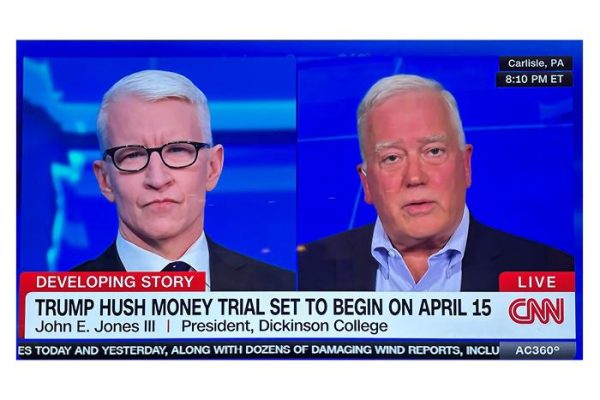Strategic Planning Commitee Criticized for Student Representation, Need Awareness
The Dickinson College Strategic Framework was critiqued by students during Dickinson’s Strategic Plan Student Listening Sessions on Thursday, April 12.
The framework was written by the college’s Strategic Planning Committee. The Strategic Planning Committee is comprised of four students, one from each class year; five faculty, who are of different ranks and discipline; eight staff, who represent various administrative units and/or large departments; four members of the Board of Trustees, who are also alumni; and one alumnus that is not on the board according to Ashley Perzyna, assistant chief of staff of the college.
Perzyna said that the Strategic Planning Committee’s task was to revamp the college’s current mission and vision statements and to write new strategic goals “in the context of an evolving higher education landscape.”
Heather Flaherty, curator of education at the Trout Gallery and committee member, explained that the Strategic Framework was meant to be “a statement about who Dickinson is and what it aspires to become. It is intentionally conceptual and visionary.”
Once the document was drafted, the sessions where held “to provide a platform to discuss and gather comments and feedback from the Dickinson community about their reactions to the strategic framework,” said Perzyna.
Bryant Caballero ’21, one of the student representatives of the committee, said that these open sessions were “important for us [the committee] to meet with the larger community to ensure that the visions and aspirations of the student body were included in some form or fashion into the Strategic Plan.”
“After all,” Caballero added, “the plan is for the improvement of our school.”
During the sessions, the questions and concerns raised by students surrounded “issues of residence life, accountability in governance, Dickinson pride and students’ desires to have increased technological competencies,” said Flaherty.
For Brenda Bretz, vice president of institutional effectiveness and inclusivity and committee member, the “most salient” of these questions were those that concerned unity on campus.
Many of the students present at the session were concerned with “hear[ing] more about the ‘hows’ and ‘whens’ of the document,” said Caballero. However, the committee did not have the answers to these questions at the sessions.
Perzyna explained that over the summer, the committee will begin to try to answer these more logistical questions “with goals, metrics, key performance indicators and financial or budgetary considerations that [will] allow us [Dickinson College] to measure progress and success in the years ahead.”
Jacob Kaufhold ’21, a member of Student Senate, said that he attended the evening session “to ask a question about diversity, which features as a key component in the plan.”
Mary Hinton ’19, another member of Student Senate, expressed concern with who the committee was comprised of. “Something that I think is a problem with the plan and its committee is that, even though there is one student representative from each grade, the[re] is only [one] Student Life staff member or administrator on the committee …” Hinton said. “As students are the focus of a college, the student experience and student life should have been given more of a priority and focus.”
Olivia Riordan ’21 had other concerns as well. She said that the committee should “look more into the fact that Dickinson is need aware [knows students’ financial needs during the acceptance process] and not need blind [unaware to students’ financial needs during the acceptance process],” as she said this “could affect whether or not deserving students really do get the [financial] help and aid they deserve.” Riordan brought this to the committee’s attention because “the document stated that the college strived to make sure that all deserving students receive what they need.”
Hinton was also “frustrated” by “the low attendance of the meeting.” She said that “Many students at Dickinson complain about things or offer suggestions about how to improve the college. However, when given the opportunity to give feedback to something as important as the strategic plan, very few students show up to constructively criticize and ask questions.”
Two open sessions were held by the strategic planning committee on Thursday April 12. One session was held at 3 p.m. for faculty, staff and students while the second one at 6 p.m. was hosted by the student members of the committee and was specifically for students.
The Strategic Planning Committee can be reached with any questions or concerns about the Strategic Framework at [email protected]



